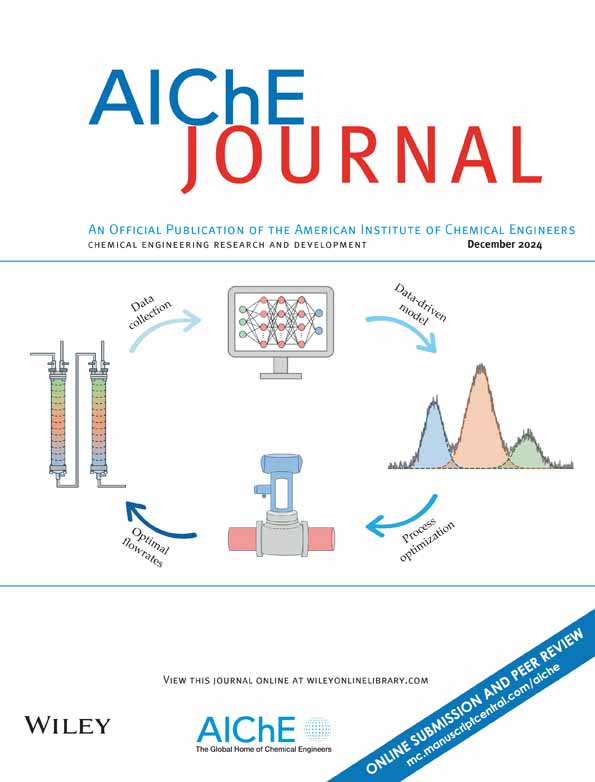A functionalized zwitterionic PAN fiber membrane with enhanced antifouling for stable emulsion separation
IF 3.5
3区 工程技术
Q2 ENGINEERING, CHEMICAL
引用次数: 0
Abstract
Membrane fouling significantly hinders the efficacy of membrane separation engineering in treating oily wastewater. Here, a combined internal and external modification strategy was presented to fabricate a functionalized zwitterionic polyacrylonitrile (PAN) fiber membrane with enhanced antifouling properties for stable emulsion separation. Internally, a zwitterionic polymer betaine methacrylate sulfonate (SBMA) was incorporated into the PAN fiber network to improve hydration, establishing hydration layer barriers to confer fouling resistance. Externally, fluorocarbon small molecules were grafted to create low-surface-energy microregions, imparting the “fouling-release” properties. Due to its fouling resistance and release properties, the resulting membrane (F-PAN@SBMA M) exhibited excellent underwater oil repellency, ultra-low oil adhesion, achieving high separation fluxes (>2000 L m−2 h−1) and efficiencies (>99.1%) for multiple oil-in-water emulsions. Enhanced antifouling properties and high flux recovery rates promoted stable separation performance and membrane regeneration. This modification strategy offers a promising pathway for developing effective membrane separation materials in industrial wastewater treatment.一种具有增强防污性能的功能化两性离子聚丙烯腈纤维膜,用于乳液的稳定分离
膜污染严重影响了膜分离工程处理含油废水的效果。本文提出了一种内外复合改性的方法,制备了具有增强防污性能的功能化两性离子聚丙烯腈(PAN)纤维膜,用于乳液的稳定分离。在内部,两性离子聚合物甲基丙烯酸甜菜碱磺酸盐(SBMA)加入到PAN纤维网络中,以改善水化,建立水化层屏障,赋予抗污垢性。在外部,氟碳小分子被接枝以创建低表面能微区,赋予“污垢释放”特性。该膜(F-PAN@SBMA M)具有优异的水下拒油性和超低的油附着力,对多种水包油乳剂具有较高的分离通量(>2000 L M−2 h−1)和效率(>99.1%)。增强的防污性能和高通量回收率促进了稳定的分离性能和膜再生。这种改性策略为开发工业废水处理中有效的膜分离材料提供了一条有前景的途径。
本文章由计算机程序翻译,如有差异,请以英文原文为准。
求助全文
约1分钟内获得全文
求助全文
来源期刊

AIChE Journal
工程技术-工程:化工
CiteScore
7.10
自引率
10.80%
发文量
411
审稿时长
3.6 months
期刊介绍:
The AIChE Journal is the premier research monthly in chemical engineering and related fields. This peer-reviewed and broad-based journal reports on the most important and latest technological advances in core areas of chemical engineering as well as in other relevant engineering disciplines. To keep abreast with the progressive outlook of the profession, the Journal has been expanding the scope of its editorial contents to include such fast developing areas as biotechnology, electrochemical engineering, and environmental engineering.
The AIChE Journal is indeed the global communications vehicle for the world-renowned researchers to exchange top-notch research findings with one another. Subscribing to the AIChE Journal is like having immediate access to nine topical journals in the field.
Articles are categorized according to the following topical areas:
Biomolecular Engineering, Bioengineering, Biochemicals, Biofuels, and Food
Inorganic Materials: Synthesis and Processing
Particle Technology and Fluidization
Process Systems Engineering
Reaction Engineering, Kinetics and Catalysis
Separations: Materials, Devices and Processes
Soft Materials: Synthesis, Processing and Products
Thermodynamics and Molecular-Scale Phenomena
Transport Phenomena and Fluid Mechanics.
 求助内容:
求助内容: 应助结果提醒方式:
应助结果提醒方式:


